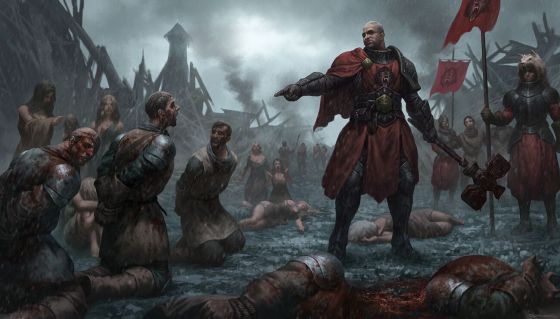Difference between revisions of "Leader"
Tao alexis (talk | contribs) |
Tao alexis (talk | contribs) |
||
| (12 intermediate revisions by the same user not shown) | |||
| Line 3: | Line 3: | ||
== Qualities == | == Qualities == | ||
| − | Except on a clan-level, leaders have | + | Except on a clan-level, leaders have little freedom to personally make decisions. In large groups, leaders directly control non-levelled persons or ranks, conveying — without explaining — the objectives of [[Sub-chief|sub-chiefs]] and [[Chieftain|chieftains]] who liaison directly with members of the ruling class or body politic. Though a leader may no better understand the orders being given than an ordinary soldier, good leaders have learned to accept obedience without needing to know or complain — even though the orders being given may involve great personal risk or unpleasantness. |
| − | Leaders are therefore often chosen for their social position, personal sense of duty, their functional skills and their charisma. None of these traits are required; but each contributes to the success of a leader within an | + | Leaders are therefore often chosen for their social position, personal sense of duty, their functional skills and their charisma. None of these traits are required; but each contributes to the success of a leader within an organisation's hierarchy. Not all levelled persons are able to be leaders; however, though most leaders are of the fighter class, '''any''' [[Character Class|character class]] may potentially yield a leader, so long as they have studied [[Judgement (sage study)|judgement]], [[Morale Strengthening (sage study)|morale strengthening]] or [[Motivation (sage study)|motivation]]. A leader should be considered of amateur-status in any one of these three studies. |
| − | == | + | == Generation == |
| − | When generating the | + | When generating the [[Ability Stats|ability stats]] for a leader [[Non-player Characters (NPCs)|non-player character]], roll 4d6 (discarding lowest die) '''twice''' and 3d6 '''four''' times. Arrange the numbers from highest to lowest accordingly: [[Primary Attributes|primary attribute]], [[Strength (ability stat)|strength]], [[Constitution (ability stat)|constitution]], [[Charisma (ability stat)|charisma]], [[Intelligence (ability stat)|intelligence]], [[Dexterity (ability stat)|dexterity]], [[Wisdom (ability stat)|wisdom]]. Once the stats are arranged, add +1 to intelligence and wisdom. When rolling hit points, "1s" and "2s" should be re-rolled. |
| + | |||
| + | The character's '''[[Aging|age]]''' should be generated normally, +2d4 years (1 in 8 leaders will be 2d8+7 years older). For example, a typical 1st level human fighter is 14+1-4 years old. This is increased by 2-8 in most cases, and 9-24 years otherwise. | ||
| + | |||
| + | These are guidelines and need not be adhered to exactly for game purposes. | ||
| + | |||
| + | |||
| + | See [[The Adventure]] | ||
Latest revision as of 23:57, 6 July 2022
Leaders are levelled characters who have reached 1st or 2nd level, most often fighters, who have responsibility over a clan or a part of a tribe. Among primitive peoples, leaders describe those who through combat and experience have eventually acquired a level; among civilized cultures, leaders are trained. Any 1st level fighter, paladin or ranger with knowledge in leadership may apply for a position leading soldiers in times of war or as a titled member of a town guard or watch.
Qualities
Except on a clan-level, leaders have little freedom to personally make decisions. In large groups, leaders directly control non-levelled persons or ranks, conveying — without explaining — the objectives of sub-chiefs and chieftains who liaison directly with members of the ruling class or body politic. Though a leader may no better understand the orders being given than an ordinary soldier, good leaders have learned to accept obedience without needing to know or complain — even though the orders being given may involve great personal risk or unpleasantness.
Leaders are therefore often chosen for their social position, personal sense of duty, their functional skills and their charisma. None of these traits are required; but each contributes to the success of a leader within an organisation's hierarchy. Not all levelled persons are able to be leaders; however, though most leaders are of the fighter class, any character class may potentially yield a leader, so long as they have studied judgement, morale strengthening or motivation. A leader should be considered of amateur-status in any one of these three studies.
Generation
When generating the ability stats for a leader non-player character, roll 4d6 (discarding lowest die) twice and 3d6 four times. Arrange the numbers from highest to lowest accordingly: primary attribute, strength, constitution, charisma, intelligence, dexterity, wisdom. Once the stats are arranged, add +1 to intelligence and wisdom. When rolling hit points, "1s" and "2s" should be re-rolled.
The character's age should be generated normally, +2d4 years (1 in 8 leaders will be 2d8+7 years older). For example, a typical 1st level human fighter is 14+1-4 years old. This is increased by 2-8 in most cases, and 9-24 years otherwise.
These are guidelines and need not be adhered to exactly for game purposes.
See The Adventure
